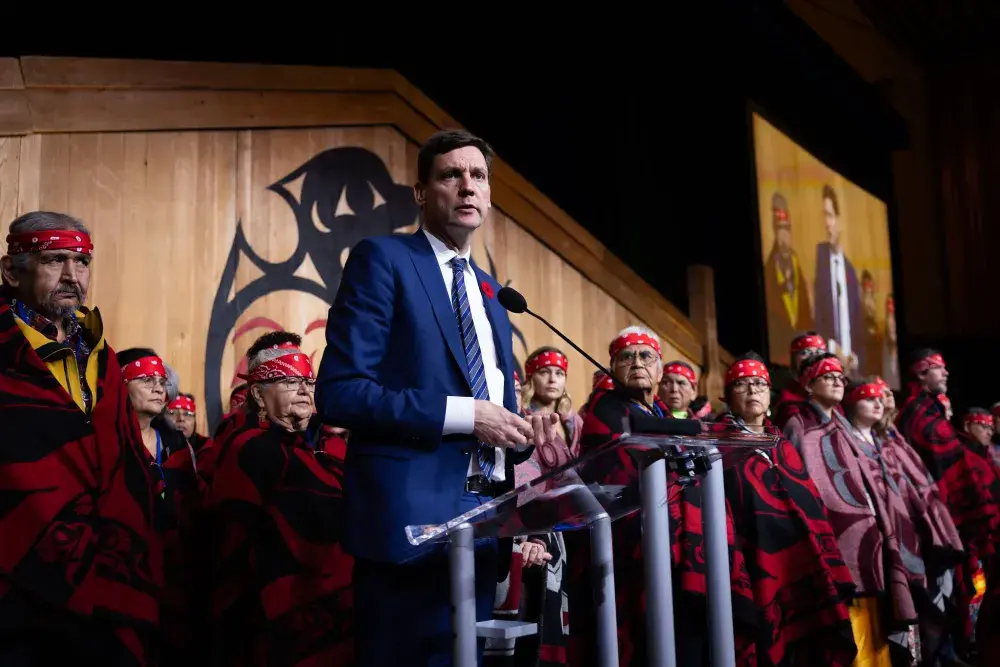As B.C.’s Indigenous leaders come together for the 10th annual First Nations Leadership Council Gathering, Premier David Eby and his cabinet were there to take part in two days of political discussions at the Vancouver Convention Centre.
Held Nov. 4 and 5 in downtown Vancouver, the gathering brings together more than 1,200 people with representation from the 204 First Nations from all corners of the province. First Nations leaders said it is a chance for them to bring forward issues that can be worked on with the province.
Early on the first day of the gathering, Premier Eby shared the stage with Indigenous leaders to answer media questions. The discussion focused on the Quw’utsun Nation Aboriginal Title court decision, in which a B.C. Supreme Court justice ruled that the First Nation proved it has Aboriginal title over 1,846 acres (about 7.5 square kilometers) of land on and around the southern portion of Lulu Island (now City of Richmond) on the southern arm of the Fraser River. While it was celebrated as a victory for most of the First Nations, the ruling raised concerns for private property and business owners in the claim area.
In October 2025 the BC Supreme Court issued its ruling, finding that the Quw’utsun (Cowichan) Tribes’ plaintiffs, representing Stz’uminus First Nation, Penelakut Tribe, Halalt First Nation, and Lyackson First Nations, have established Cowichan Aboriginal title to a portion of the claim area, including a summer fishing village and the right to harvest fish on a portion of the southern arm of the Fraser River.
The court found that that plaintiff’s ancestors were improperly and unjustly displaced from the claim area. Over time, portions of the claim area were developed, renamed, bought and sold without consultation with the plaintiff First Nations.
Further, the court said the Crown’s grants of fee simple land to settlers did not extinguish the Cowichan Nation’s title.
“Crown and city titles on the land are defective, and the granting of private titles by the government unjustifiably infringed on Cowichan title,” stated the court decision.
The ruling has raised fears and uncertainty for private property owners in the claim area, prompting Quw’utsun Tribes to issue a statement.
“The Quw’utsun Nations’ court case regarding their settlement lands at Tl’uqtinus (summer village on Lulu Island) in Richmond has not and does not challenge the effectiveness or validity of any title held by individual private landowners. The ruling does not erase private property,” they said in a written statement.
They went on to say that several generations of their people were impacted by the alienation of their lands and fishing grounds.
“However, we are a respectful people. We intentionally did not bring this case against any individual private landowners, and we did not seek to invalidate any of their land titles. The decision makes it clear that it is B.C.’s obligation to advance reconciliation in these circumstances,” said Quq’utsun Nation Chief Cindy Daniels.
While Eby agrees that the province’s “forebearers politically displaced the Cowichan people from a plot of land,” he said the provincial government is appealing the ruling. This is not due to the province taking issue with the Cowichan Tribe’s Aboriginal title over the lands, but because they seek clarity over what this means for about 150 private land owners affected by this court ruling.
Eby stated that the provincial government has an obligation to both the Cowichan people, who were unjustifiably displaced from their land, and also the private property owners.
“We believe that the judge made some very serious errors in relations to property owners in Richmond,” said Eby.
Both the Cowichan and the premier say that private property owners in the claim area were not notified and not kept informed of the court proceedings.
“Both the Cowichan people and the B.C. government were reassured by the court that there would be no aspect of the decision that would compromise those private property rights,” said Eby. “So these are serious issues that need to be address on appeal.”
He went on to say that it can be hard work but not impossible.
“We’ve done it before through Haida Gwaii and through treaties,” said Eby.
Chief Shana Thomas of the First Nations Summit said that the Cowichan Nation chiefs held a press conference after the ruling to address concerns raised by private property owners throughout the province. In that press conference, she said the chiefs stressed they didn’t want to displace anybody.
“They know what that feels like,” she stated.
Thomas pointed to the treaty process as the path forward to certainty in British Columbia. Through negotiated treaties, private property and business owners get certainty and First Nations get constitutional protection.
In the Maa-nulth treaty, which involves the Huu-ay-aht, Uchucklesaht, Yuułuʔiłʔatḥ, Toquaht and Ka:'yu:'k't'h'/Che:k'tles7et'h' First Nations, existing private properties were not expropriated.
“The treaty process aimed to provide certainty for all parties, and a key principle was that private property would not be expropriated for treaty settlements,” according to information about the Maa-nulth treaty on government websites.
Thomas said that people need to understand Aboriginal title. She said that the Crown has underlying title to all privately-owned fee simple land in B.C., and nobody bats an eye.
“We need to rethink Aboriginal title and understand what it means,” she said.
Both Eby and Thomas say it is the duty of the province and the Crown to resolve the issue with the Cowichan people.
With respect to the work being done at the BC First Nations Leaders Gathering, Chief Thomas spoke of the importance of advancing reconciliation.
“It’s really important that British Columbians understand that reconciliation isn’t something we opt into,” she said. “Reconciliation is something we must do no matter the political climate. The ability to build an economy together is dependant on reconciliation, and this we can do that together.”

